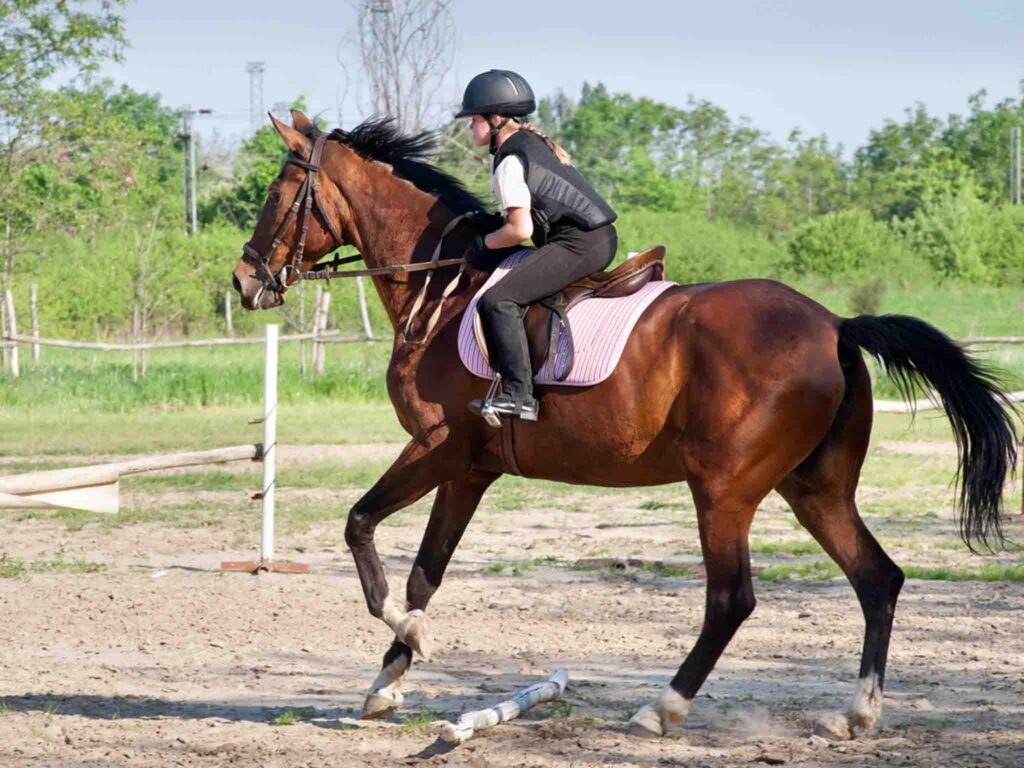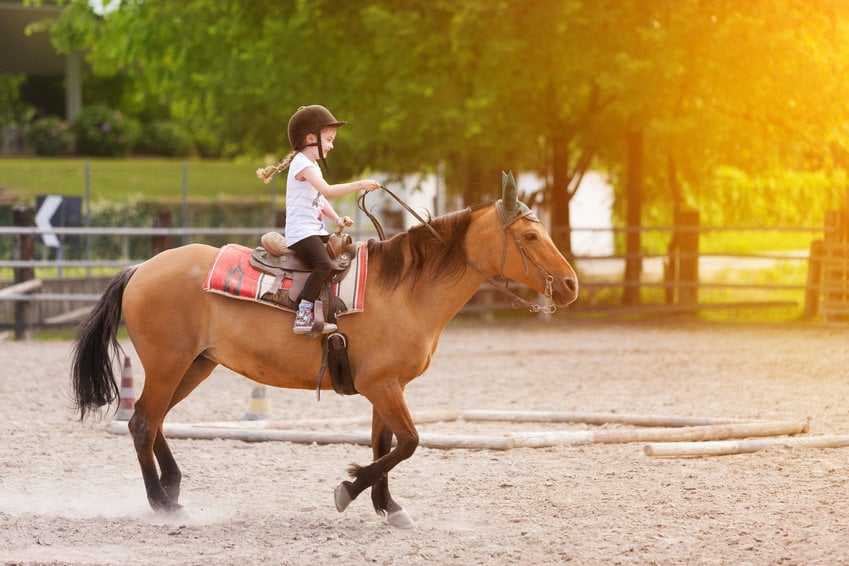If you’re looking to improve your problem-solving skills while enjoying a thrilling activity, then horseback riding might just be what you need. This article explores the influence of horseback riding on problem-solving abilities, shedding light on the hidden benefits of this popular recreational activity. Whether you’re a seasoned equestrian or considering trying horseback riding for the first time, this article will provide you with valuable insights into how this enjoyable pastime can enhance your cognitive abilities. So saddle up and get ready to discover the untapped potential of horseback riding in this fascinating exploration of its influence on problem-solving.
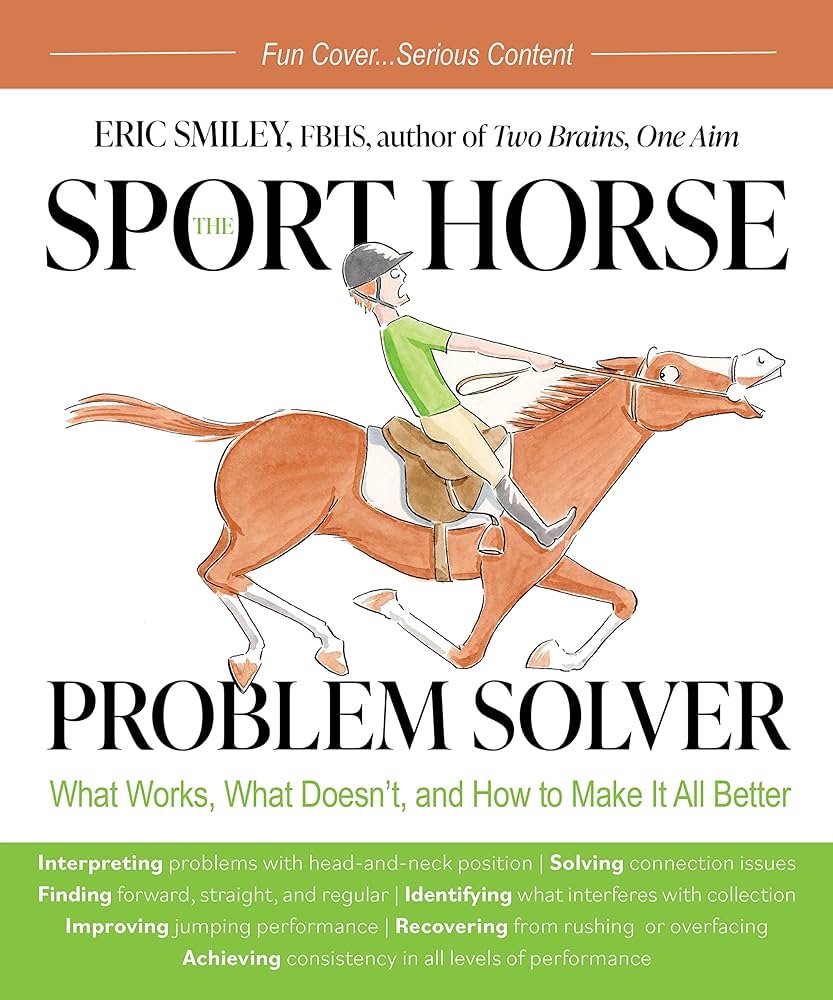
The Benefits of Horseback Riding
Horseback riding offers a wide range of benefits that go beyond just the physical aspect. Not only does it provide a fantastic way to stay active and fit, but it also has several mental, emotional, and social benefits. So whether you’re an experienced rider or just starting out, here’s why horseback riding can be a great choice for you.
Physical Benefits
When it comes to physical benefits, horseback riding offers an excellent form of exercise. The act of riding itself requires balance, coordination, and core strength. By engaging in these physical movements, you can improve your overall posture and muscle tone. Riding also helps to develop important muscle groups such as the thighs, calves, and back.
Additionally, horseback riding can improve cardiovascular health as it provides an aerobic workout. This activity gets your heart pumping and increases your lung capacity, ultimately enhancing your endurance levels. So, not only are you getting some fresh air and enjoying nature, but you’re also keeping your body strong and healthy.
Mental and Emotional Benefits
Horseback riding is not only beneficial for your physical well-being but also for your mental and emotional state. Spending time with horses and engaging in this activity can have a positive impact on your overall mood and mindset.
One significant mental benefit of horseback riding is stress reduction. Being around these majestic creatures and connecting with them can create a sense of calm and relaxation. The rhythmic motion of riding and focusing on the horse’s movement can help clear your mind and relieve stress.
Furthermore, horseback riding can boost your self-confidence and self-esteem. Mastering the skill of riding and establishing a bond with your horse can give you a sense of accomplishment and empowerment. Overcoming challenges and obstacles during your riding journey can build your confidence both on and off the horse.
Social Benefits
Horseback riding is also a fantastic way to enhance your social connections and build relationships. Whether you’re riding at a stable or joining a riding club, you’ll have the opportunity to meet new people who share the same passion for horses.
Participating in group lessons, clinics, or even horse shows can provide a sense of camaraderie and teamwork. You can learn from experienced riders, exchange tips and advice, and support each other’s progress. These social interactions can create lasting friendships and contribute to a sense of community.
Moreover, horseback riding can be a wonderful bonding experience for families. Spending quality time together on horseback allows for shared memories and the chance to support each other’s progress. It can also teach children valuable lessons about responsibility, empathy, and teamwork.
The Relationship Between Horseback Riding and Problem-Solving
Horseback riding and problem-solving go hand in hand, as engaging in this activity can foster the development of critical thinking skills, improve decision-making abilities, and enhance problem-solving strategies.
Development of Critical Thinking Skills
When working with horses, riders are constantly faced with unique situations that require critical thinking. Horses are intelligent animals with their own personalities, which means each interaction requires riders to assess the situation and adapt their approach accordingly. This process of analyzing, evaluating, and making informed decisions helps to hone critical thinking skills.
For example, when encountering a new obstacle on a trail ride, riders must assess the safest way to navigate it, taking into consideration their own abilities, the horse’s behavior, and the terrain. This critical thinking process allows riders to develop problem-solving skills that can be applied to other areas of their lives.
Improvement of Decision-Making Abilities
Horseback riding requires riders to make split-second decisions, which can significantly improve their decision-making abilities. Whether it’s choosing the correct path to take or reacting to a sudden movement from the horse, riders must make quick choices under pressure.
This constant decision-making practice helps riders become more confident in their abilities to make sound judgments, even in high-pressure situations. These improved decision-making skills can be invaluable in various aspects of life, including work, relationships, and personal growth.
Enhancement of Problem-Solving Strategies
Problem-solving is a crucial skill in both professional and personal realms. Horseback riding provides a unique opportunity to enhance problem-solving strategies through various scenarios riders encounter.
For instance, if a rider is struggling with a specific riding technique or achieving a particular movement, they must analyze the issue, seek guidance from trainers or experienced riders, and actively work on finding a solution. This process of trial and error helps riders become adaptable, persistent, and resourceful problem solvers.
The Role of Horseback Riding in Cognitive Development
Apart from problem-solving skills, horseback riding also plays a significant role in cognitive development. Engaging in this activity can improve focus and concentration, enhance memory and learning, and stimulate creativity.
Improvement of Focus and Concentration
Riding a horse requires riders to stay focused and attentive to their surroundings. They need to be aware of their horse’s movements, anticipate potential obstacles, and adjust their position and aids accordingly. This constant focus and concentration help to train and improve these cognitive skills.
Moreover, riding in different environments, such as trail riding or participating in competitions, demands even greater focus and concentration. Riders must remain alert to changing landscapes, other riders, and potential hazards. This enhanced focus can then be transferred to other tasks and activities in life.
Enhancement of Memory and Learning
Learning to ride a horse involves acquiring a multitude of skills, from basic horsemanship to advanced riding techniques. Remembering and applying these skills can have a profound impact on memory and learning abilities.
As riders progress in their journey, they develop muscle memory and mental recall for specific movements, commands, and cues. This process not only improves their riding abilities but also strengthens memory pathways in the brain. This enhanced memory and learning can extend beyond the riding arena and contribute to better overall cognitive function.
Stimulation of Creativity
Horseback riding itself can foster creativity as riders have to think creatively to connect and communicate with their horses effectively. Each horse has its own unique personality and learning style, which means riders must adjust their approach and come up with innovative methods to establish a connection.
Riders often need to find creative solutions when faced with challenges or obstacles, whether it’s finding a new way to overcome a riding difficulty or designing an obstacle course for training purposes. This stimulation of creativity can expand riders’ problem-solving abilities and improve their overall cognitive flexibility.
The Connection Between Horseback Riding and Emotional Intelligence
Horseback riding has a profound impact on emotional intelligence, which encompasses the development of empathy and compassion, improvement of emotional regulation, and building trust and confidence.
Development of Empathy and Compassion
Interacting with horses can foster the development of empathy and compassion. Horses are highly sensitive animals that respond to the emotions and energy of those around them. As riders learn to understand and connect with their horses, they can also develop a deeper understanding of empathy and compassion.
Riders must learn to interpret the subtle cues and body language of their horses, which helps them better understand and respond to the horse’s needs and emotions. This empathetic connection can then be translated into better understanding and communication with other individuals, both human and animal alike.
Improvement of Emotional Regulation
Horses are incredibly perceptive creatures, and their response to human emotions can be a mirror to our own emotional states. When riders engage with their horses, they must learn to regulate their own emotions effectively.
On horseback, riders need to remain calm, patient, and composed, even in challenging or unexpected situations. By practicing emotional regulation in this context, riders can transfer these skills to their daily lives, improving their ability to manage stress, handle conflicts, and navigate emotional challenges.
Building Trust and Confidence
Building a bond of trust and confidence is a fundamental aspect of horsemanship. Horses are naturally prey animals, and establishing a partnership with these powerful animals requires trust and mutual respect.
Riders must learn to communicate effectively, build a rapport, and understand their horses’ needs and boundaries. This process not only deepens the connection with the horse but also builds trust and confidence within the rider. This newfound trust and confidence can then positively impact other areas of life, such as relationships, personal goals, and leadership roles.

Horseback Riding as a Therapeutic Activity for Problem-Solving
Horseback riding has long been recognized as a therapeutic activity that can help individuals improve problem-solving skills. Two popular approaches in this regard are Equine-Assisted Psychotherapy and Equine-Assisted Learning, both of which utilize horses to facilitate personal growth and problem-solving.
Equine-Assisted Psychotherapy
Equine-Assisted Psychotherapy (EAP) is a form of therapy that involves horses as an integral part of the treatment process. In EAP, licensed therapists work together with horses to address emotional, behavioral, and mental health challenges.
Through engaging with horses, individuals can explore and work through their issues, develop problem-solving strategies, and gain insights into their own patterns and behaviors. Horses provide non-judgmental feedback and serve as a metaphor for various life situations, allowing individuals to find new perspectives and solutions to their problems.
Equine-Assisted Learning
Equine-Assisted Learning (EAL) is an educational approach that utilizes horses to enhance problem-solving and learning skills. In EAL programs, participants engage in activities and tasks that require problem-solving, critical thinking, and effective communication.
These activities can range from grooming and leading horses to navigating obstacle courses or participating in team challenges. By working with horses, individuals are encouraged to think creatively, communicate clearly, and find solutions to the tasks at hand. The feedback and responses from the horses help participants gain insights into their problem-solving abilities and develop strategies for future challenges.
Solution-Oriented Approaches
In addition to EAP and EAL, horseback riding can be approached from a solution-oriented perspective. This approach focuses on setting goals, identifying obstacles, and finding creative solutions to overcome them.
Riders can actively engage in problem-solving exercises during their riding sessions, such as trail riding and decision-making scenarios. By actively participating in these activities, riders can sharpen their problem-solving skills, develop strategies for overcoming obstacles, and build confidence in their ability to find solutions.
The Influence of Horseback Riding on Leadership Skills
Horseback riding can have a significant impact on the development of leadership skills. Communication, trust-building, and decision-making are essential aspects of effective leadership, and these skills can be honed through the interaction with horses.
Development of Effective Communication
Horses are highly attuned to non-verbal communication and respond to a rider’s body language, energy, and subtle cues. Effective communication with horses requires clarity, consistency, and responsiveness.
When riders learn to communicate effectively with their horses, they develop important skills that can be transferred to their leadership roles. Clear communication, both verbal and non-verbal, fosters understanding and cooperation within teams and helps leaders convey their vision and goals effectively.
Building Trust and Respect
Trust and respect are crucial components of leadership. Building a partnership with a horse requires earning their trust and respect through consistent and fair treatment.
Leaders must also establish trust and respect among their team members. By practicing these qualities with horses, riders can learn to apply them to real-life situations, building stronger relationships, and fostering a positive leadership style.
Enhancement of Decision-Making Skills
Leaders are often faced with difficult decisions that can impact the success of their teams or organizations. Horseback riding provides an opportunity to enhance decision-making skills in a unique and challenging environment.
Riders must make decisions quickly and effectively, considering the safety of themselves and their horses. These decision-making skills can be transferred to leadership roles, helping individuals make well-informed and timely choices.
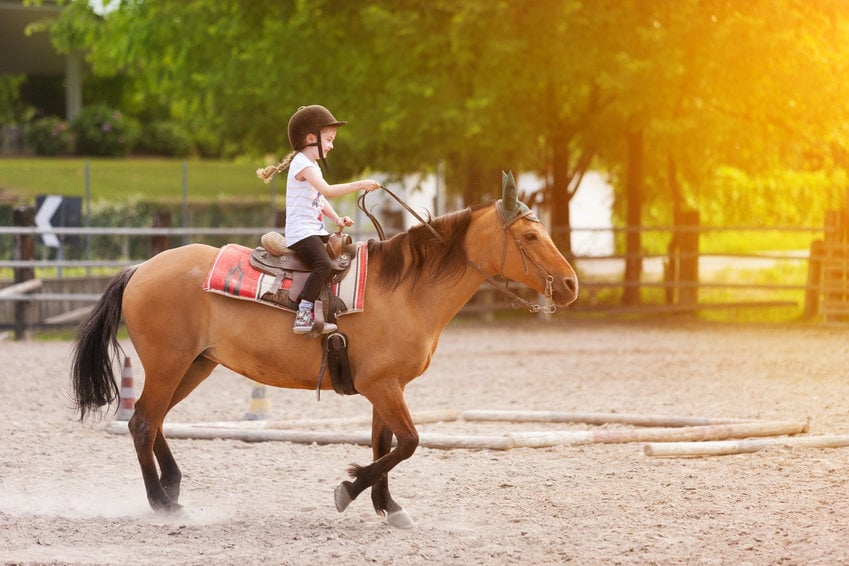
Case Studies on the Impact of Horseback Riding on Problem-Solving
To further understand the impact of horseback riding on problem-solving, let’s explore a few case studies that highlight its benefits in different scenarios.
Case Study 1: Improving Problem-Solving Abilities in Children
A study conducted with a group of children between the ages of 8 and 12 aimed to assess the impact of horseback riding on problem-solving abilities. The children participated in a horseback riding program that involved various problem-solving tasks, such as navigating obstacle courses and trail riding.
The results showed that the children displayed improved problem-solving skills, increased confidence in their abilities, and developed a greater sense of resilience. The interaction with horses and the challenges they faced during the riding activities contributed to their problem-solving growth.
Case Study 2: Overcoming Obstacles through Horseback Riding
In another case study involving adolescents with behavioral challenges, horseback riding was used as a therapeutic activity to enhance problem-solving skills. The participants engaged in Equine-Assisted Psychotherapy sessions where they worked with horses to address their emotional and behavioral difficulties.
Over the course of the sessions, the adolescents developed problem-solving strategies to overcome obstacles they faced both on and off the horse. The connection and bond they formed with the horses served as a motivating factor to find solutions, leading to improved problem-solving abilities and emotional well-being.
Case Study 3: Enhancing Decision-Making Skills in Adolescents
A study conducted with a group of adolescents focused on the impact of horseback riding on decision-making skills. The participants took part in a horseback riding program that involved learning and practicing various riding techniques, participating in obstacle courses, and trail riding.
Through these activities, the adolescents had to make decisions quickly and effectively to navigate the riding challenges. The results indicated that their decision-making skills significantly improved, and they gained a greater sense of confidence in their ability to make sound judgments. The experience of riding and facing different scenarios enhanced their problem-solving capacity.
Horseback Riding Activities for Problem-Solving Enhancement
There are several horseback riding activities that can specifically target and enhance problem-solving skills. Here are a few examples:
Trail Riding and Decision-Making
Trail riding provides an excellent opportunity for riders to engage in decision-making exercises. As riders navigate through different terrains and encounter various obstacles, they must assess the situation and make informed choices.
During trail rides, riders can practice problem-solving skills by choosing the safest path, adjusting their riding technique to different environments, and managing unexpected situations. These decision-making exercises on horseback contribute to overall problem-solving growth.
Obstacle Courses and Critical Thinking
Engaging in obstacle courses challenges riders’ critical thinking skills and problem-solving abilities. The course may include various elements such as jumps, gates, or bridges that require riders to assess the best approach and navigate the obstacles successfully.
Riders must think critically, analyze the course layout, and make strategic decisions to overcome each obstacle. These exercises promote problem-solving skills, adaptability, and quick thinking.
Team Challenges and Problem-Solving Strategies
Participating in team challenges on horseback fosters collaboration, communication, and problem-solving as a group. These team challenges can involve tasks such as herding cattle, navigating through an obstacle course together, or coordinating movements during a drill or formation.
By working together and combining their problem-solving abilities, riders can find creative solutions and accomplish the given tasks. These collaborative problem-solving exercises strengthen both individual and group problem-solving skills.
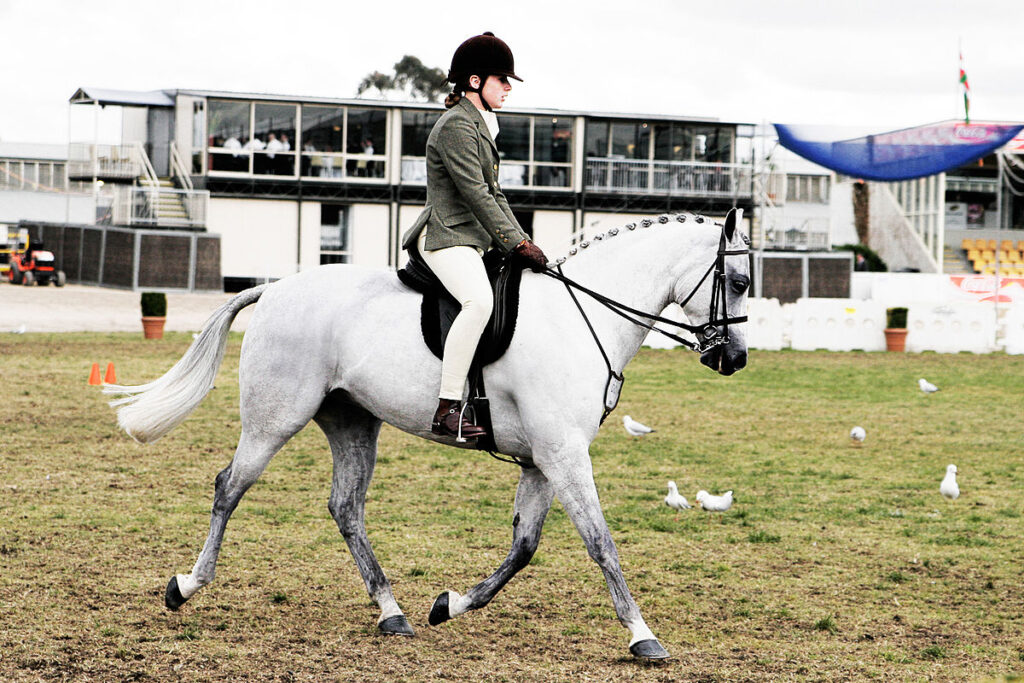
Tips for Incorporating Horseback Riding into Problem-Solving Exercises
To effectively incorporate horseback riding into problem-solving exercises, consider the following tips:
Setting Goals and Objectives
Before each riding session, establish clear goals and objectives for the problem-solving exercises. Whether it’s improving decision-making skills, enhancing communication, or overcoming specific challenges, having a clear focus will maximize the benefits of the activities.
Effective Communication with the Horse
Communication with the horse is key during problem-solving exercises. Practice clear and consistent cues, body language, and energy levels to effectively communicate your intentions to the horse. The horse’s responses provide valuable feedback that aids in problem-solving and enhances your riding experience.
Reflecting on the Riding Experience
Take the time to reflect on each riding session and problem-solving exercise. Evaluate your actions, decisions, and outcomes. Reflecting on the experience can help identify areas for improvement, reinforce successful strategies, and contribute to continual growth and development.
Considerations for Beginners Interested in Horseback Riding for Problem-Solving
If you are a beginner interested in utilizing horseback riding to enhance problem-solving skills, there are a few considerations to keep in mind:
Choosing the Right Horseback Riding Program
Select a reputable horseback riding program that offers structured lessons and activities focused on problem-solving. Look for programs that provide experienced instructors who can guide you through the process and ensure your safety.
Safety Precautions and Proper Equipment
Safety should be a top priority when engaging in horseback riding. Always wear appropriate safety gear such as a helmet and boots, and follow the instructions and guidelines provided by your instructor or stable. Proper equipment and safety precautions create a conducive environment for problem-solving activities.
Professional Guidance and Instruction
Seek professional guidance and instruction when starting out. Working with a qualified riding instructor can help you develop proper riding skills, improve problem-solving abilities, and ensure a positive and safe riding experience.
By considering these factors, beginners can set a solid foundation for their horseback riding journey and maximize the problem-solving benefits this activity has to offer.
In conclusion, horseback riding offers numerous physical, mental, emotional, and social benefits. It fosters the development of critical thinking skills, enhances decision-making abilities, and improves problem-solving strategies. Horseback riding also plays a significant role in cognitive development by improving focus and concentration, enhancing memory and learning, and stimulating creativity. The connection between horseback riding and emotional intelligence is evident through the development of empathy and compassion, improvement of emotional regulation, and the building of trust and confidence. Additionally, horseback riding acts as a therapeutic activity for problem-solving, with Equine-Assisted Psychotherapy and Equine-Assisted Learning offering unique approaches. It also influences leadership skills by promoting effective communication, building trust and respect, and enhancing decision-making abilities. Through case studies, the positive impact of horseback riding on problem-solving becomes evident. Various horseback riding activities and exercises can be incorporated to target problem-solving skills, such as trail riding, obstacle courses, and team challenges. By setting goals, communicating effectively with the horse, and reflecting on the riding experience, individuals can maximize the problem-solving benefits of horseback riding. Beginners should consider choosing the right horseback riding program, prioritizing safety precautions and proper equipment, and seeking professional guidance and instruction. Overall, horseback riding provides a comprehensive and engaging way to improve problem-solving abilities while enjoying the beauty and connection with these magnificent creatures.
